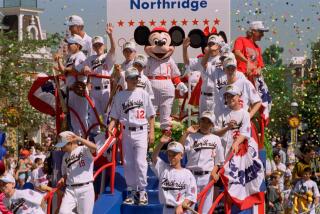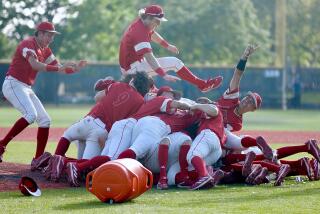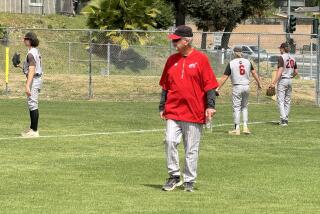Rhoades’ Scholars : He Teaches Winning Attitude at Moorpark and Players Catch On
- Share via
MOORPARK — When you enter the Moorpark High varsity baseball field from the east, the first thing you see is the right-field foul pole. It’s bright gold, with netting--a scaled down version of a major league foul pole.
The new outfield fence is lined with bulletin-board advertisements, like the fences of so many minor league parks across America. The grass is deep green, the infield manicured. Even batting practice looks professional. Coach David Rhoades, behind a protective screen, winds up like a pitching machine and throws strike after strike.
One by one, the Musketeers take their cuts and shag fly balls, following the routine seen in the big leagues. It’s no coincidence. Rhoades is a former professional player who has brought a big-league atmosphere to a once-floundering program.
“The good thing for me was getting that taste of pro baseball,” Rhoades said. “I have that frame of reference.”
Moorpark needed the boost. The Musketeers once went more than 40 years without qualifying for the playoffs. Former Coach Mario Porto started the turnaround in 1989, Moorpark’s first playoff appearance since World War II. Rhoades had taken a teaching job at nearby Arroyo West Elementary School and started as Moorpark’s junior varsity coach in 1986, the year after he retired as a player. As head coach, he has brought the team to new heights.
Moorpark, 68-40-1 under Rhoades, has won three straight league championships. The Musketeers (19-4) won the Frontier League championship with an 11-1 record this year and will make their sixth consecutive postseason appearance today, playing host to Santa Ynez in the first round of the Southern Section Division IV playoffs.
Nineteen victories is a school record but none was more important than No. 12. It came against Simi Valley--a team with a national reputation located a scant eight miles east of Moorpark but once a continent away on the baseball map.
“The kids like the way David does things,” said Porto, now an assistant at Moorpark College. “He’s on an even keel. He’s very low key. He’s not a screamer and yeller. I was a screamer and yeller.”
Rhoades, 32, is something far different. Clean-cut, fit, always in perfect posture and wearing a uniform that is neatly pressed, Rhoades conjures up images of former Dodger first baseman Steve Garvey.
“He’s exactly like Garvey,” shortstop Rick Collier said. “I’ve only seen him yell at the umpire once. He never cusses. And if you cuss, he says pick a different word.”
Said Porto: “He has that type of image--a Steve Garvey image. He’s a very classy guy. He carries himself well. He represents the game well.”
Rhoades, a native of Hayden, Ariz., who grew up a Dodger fan, welcomes the Garvey comparison.
“I believe that there is a lot to this role-model thing,” Rhoades said. “None of us are perfect by any means. But the little things that we do can mean a lot to a kid--more than what we say.
“You hear it all time--and I really believe it: More important than winning or losing out here is building some character in these kids and helping them to be good, class people.
“My big thing with them is they’re not baseball players. A baseball player is someone who gets paid to play baseball. Then they can write on their resume or application, ‘baseball player.’ But you’re a student--until you sign a pro contract. You’re a student first. That has to come first.”
Back on the practice field, Rhoades’ players move quietly through a tightly orchestrated workout. Less time for idle conversation means more time to think and feel baseball.
“You do everything crisp, clean and get it done,” said Jason Adamson, a three-year starter being recruited by Division I schools. He might soon be writing “baseball player” on his resume. “That’s how it’s supposed to be done. And it’s made us appreciate the game more.
“I’ll cherish these three years. I feel I’m lucky to have him as a coach. I’ve learned so much more about baseball under him, and how it should be played.”
Every phase of Moorpark’s game is solid. The team batting average is .304. The team earned-run average is 2.62. The lineup is balanced with left-handed and right-handed batters, the defense is solid up the middle and the outfielders are fast.
Rhoades’ two greatest concerns before the season--pitching and run production--have been laid to rest by an offense that averages 7.8 runs a game and a staff that features two tough competitors with identical 2.37 ERAs--seniors Brian Garrettson and Mike Vasquez.
And any theory that Moorpark’s success came from feeding off inferior competition was dashed on April 16, when it toppled Simi Valley. The Musketeers trailed twice before winning, 9-5, in the championship game of the Camarillo tournament.
“By the third or fourth inning we thought, ‘Maybe we can play with these guys,’ ” Rhoades said. “By the fifth or sixth inning, we were thinking, ‘Hey, let’s stop playing with them. Let’s beat ‘em.’ ”
There was no dog pile on the mound when junior Andy Huisenga, making his first start of the season, got Brian Kavanagh to fly to center field for the final out. No gloating by the winners in this crazy upset.
Rhoades said before the game it was an honor to share the diamond with Simi Valley and his players remained humble.
“We don’t pop off in the game or talk smack,” Adamson said. “We never leave trash (in the dugout). And that’s how (Rhoades) wants it. And there’s no one that will ever question him, because they respect him too much.”
Moorpark had the talent to challenge Simi Valley, Rhoades said, but it was his job to raise their expectations.
“I think the biggest thing is the mental part of their game,” he said. “They’re a good team. Getting them to play good is the challenge.”
But this is where Rhoades, drawing from his baseball background, has excelled.
“I’ve never heard him talk about (his days in pro ball); he’s never brought it up,” Collier said. “But he knows situations. You know he’s been there. He knows the mental aspect of the game. He feels for us. So when someone messes up, he doesn’t get down on him.”
Rhoades said he chooses his moments to talk about his past, like with Adamson, a 6-foot-3, 190-pound prospect who is being recruited by USC, Long Beach State, Oklahoma and Porto at Moorpark College. Rhoades has helped Adamson stay on an even keel amid all the attention from scouts and recruiters.
“He’s told me, ‘Don’t worry about it,’ ” Adamson said. “He’s said, ‘Don’t let it pressure you. Act normal. Don’t try to do anything special. Don’t muscle up.’ ”
Said Rhoades: “I try to let (Adamson) know how excited I am that scouts are interested in him. But on the other hand, I let him know how difficult it is, too. As a kid you think, ‘This is what I’m going to do. It’s the best life in the world.’ ”
In 1983, after Rhoades drove in 50 runs and stole 57 bases in two seasons at Pepperdine, he played one season for a Class-A team in Wala Wala, Wash. He played third base and shortstop, and batted around .250. He played against Texas Ranger outfielder Jose Canseco and faced Houston Astro pitcher Mitch Williams. Rhoades remembers getting a base hit off Williams, then a clean-cut, hard-throwing left-hander now better known as “Wild Thing.”
But Rhoades, now married with two young sons, said there’s a downside to the professional game that few people talk about.
“Even if you make the big leagues, the travel, the missing your family. . . . You hardly even have a family, or you can’t have a family,” he said. “It’s a night life type of thing. You play late, then you go eat dinner. And there’s nothing else to do the next day until you go to the ballpark.
“The best thing for me was getting a taste of it. Then I was able to quit knowing that I was ready. I was ready to quit playing--and not keep trying, and not having somebody else telling me (you’re finished).
“At the end, I had a little doubt, ‘Hey, do you want to do this even if you make the big leagues? Is this how I want to spend my life?’
“Of course, if you have a little doubt about that, I don’t think there’s any way in the world you’re going to make it to the big leagues.”
Rhoades likes the league he’s in now, where ballparks are smaller, eyes are wider and passion for the game can still be nurtured.
More to Read
Get our high school sports newsletter
Prep Rally is devoted to the SoCal high school sports experience, bringing you scores, stories and a behind-the-scenes look at what makes prep sports so popular.
You may occasionally receive promotional content from the Los Angeles Times.






